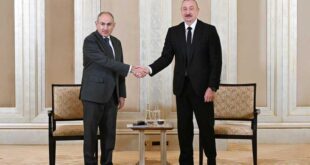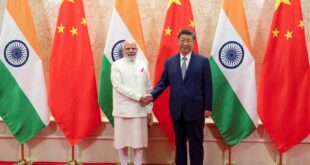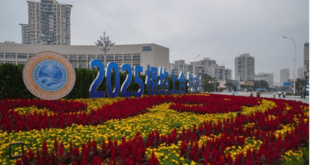It would be prudent for American policymakers to focus not on dismantling Iran’s hold on Iraq but rather on diluting its influence.
One of the most ironic and adverse strategic outcomes of the 2003 U.S.-led invasion of Iraq was the elimination of Saddam Hussein’s Baathist regime and the subsequent empowerment of a far more formidable U.S. opponent—the Islamic Republic of Iran.
Washington’s declared strategy aims to promote “a secure, stable, sovereign Iraq free from malign influence.” However, Iran’s grip on Iraq has strengthened, anchored by an array of Shia militias that align with Tehran’s strategic objective of expelling the U.S. and other foreign forces from the country and the wider region, despite differing local agendas.
The conflict in Gaza has become an arena for Iran’s regional proxies, including allied Iraqi paramilitaries, to confront the United States and Israel militarily. This situation has put Iraq at risk of being dragged into a broader conflict and presented Washington with what appear to be unpalatable choices.
Iran’s Grip on Iraq
During their prolonged and bloody relationship with Saddam Hussein, Iran’s leaders established lasting connections with all major Iraqi opposition groups. In the post-Saddam era, Iran has aimed to ensure that any Iraqi government in power in Baghdad remains weak and subservient to its interests. To achieve this objective, Iran has attempted to shape Iraqi politics by collaborating with Shia and Kurdish parties. A key instrument through which Iran wields its influence in Iraq is its network of proxy militias.
Numerous Shia paramilitary groups have surfaced in Iraq during various periods for specific purposes. Some were formed in exile in Iran during the 1980s to combat Saddam Hussein in the Iran-Iraq War. Notable among these is the Badr Organization, which has enjoyed a close relationship with Iran’s Islamic Revolutionary Guard Corps (IRGC) since its founding in 1982–1983. Iran-backed paramilitary entities expanded both during the American occupation period of 2003–2011 and in response to the rise of the Islamic State (ISIS) in 2014.
The Popular Mobilization Forces (PMF) or Al-Hashd al-Shaabi, an umbrella organization of primarily Shia paramilitary groups, emerged in 2014 to counter the threat posed by ISIS and played a crucial role in its defeat. The IRGC, particularly its Quds Force, was instrumental in supporting the PMF, providing essential training and strategic direction, as well as advising and leading operations.
The most powerful components of the PMF, both militarily and politically, are those backed by Iran, namely Kata’ib Hezbollah, Asa’ib Ahl al-Haq, and Harakat Hezbollah al-Nujaba. These factions, alongside other PMF groups, are “hybrid actors.” They operate as integral components of Iraq’s security apparatus while also maintaining autonomy as militias closely aligned with Iran. They function as military units in combat while openly engaging in Iraqi politics through party affiliation and membership in the Shia Coordination Framework (SCF), an umbrella bloc of Shia parties. They also fulfill quasi-governmental roles by delivering social services and engaging in local governance. This hybridity underscores the complexity of their role within Iraq’s security and political landscape, as well as Iran’s influence over it.
Iran’s backing of PMF entities and their significant contribution to defeating ISIS and reclaiming territories in Iraq bolstered Iran’s political influence in the country. A majority of pro-Iran groups within the PMF united politically under the Fatah Coalition, securing forty-eight seats in Iraq’s 329-member parliament during the 2018 elections. This consolidation of power enabled the coalition to exert significant influence in the formation of the government. With the Islamic State all but defeated by the end of 2018, Iran-allied militias redirected their effortstoward expelling the United States from Iraq and consolidating control over the Iraqi state. This project appeared to lose momentum with the onset of the grassroots Tishreen (October) protests in 2019.
Once celebrated as heroes, Iran-allied militias lost favor with the Iraqi public due to their corrupt and repressive practices, eroding their legitimacy and popularity. Iran’s supporters suffered setbacks at the ballot box during the October 2021parliamentary elections. Prime Minister Adel Abdul Mahdi, whose party had long maintained ties with both the Badr militia and the Iranian government, had been compelled to resign in 2019. The militias’ strength and weaknesses became evident in August 2022, when political tensions and violent clashes between the SCF aligned with Iran, and their rival, Muqtada al-Sadr, pushed Iraq to the brinkof civil war.
Yet, despite facing numerous challenges and setbacks since 2018, the PMF has demonstrated resilience in overcoming weakened leadership, internal divisions, electoral defeats, and a loss of public support. It has endured pressures stemming from the January 2020 assassinations of its former commander, Abu Mahdi al-Muhandis, and his Iranian sponsor, Qassem Soleimani, as well as from actions taken by former Prime Minister Mustafa al-Kadhimi. Indeed, the PMF has solidified its position within the Iraqi state. With the impressive showing of its candidates in the December 2023 provincial elections, the PMF has deepened its infiltration of Iraqi state institutions, expanded its economic capabilities, diversified revenue streams, and broadened its patronage network. The PMF now mirrors the model of the Islamic Revolutionary Guard Corps, an outcome in line with Iran’s strategic objectives.
Iraq’s Predicament
Iraq has paid a high price for Iran’s support of militias and expanding influence. Iranian-backed paramilitaries have intensified sectarian tensions and weakened the central government, causing instability. These forces, often acting outside the law, are linked to human rights abuses and hinder economic growth. They have also contributed to the polarization of Iraq’s political structure into pro-Iran and pro-United States camps.
Iran’s influence has dragged Iraq into regional conflicts, making it a proxy battleground for United States-Iran tensions that have placed Iraq in a complicated and increasingly untenable situation. To be sure, Iran’s actions in Iraq are far from altruistic, as illustrated by its support for paramilitary forces and other malign activities. Nevertheless, Iran is the unavoidable neighbor, with an economy interlinked with Iraq’s and a future that is inextricably connected.
Iraq can ill afford strained relations with Iran. Tehran wields significant economic influence over Iraq through its gas exports, upon which Iraq depends for roughly half of its domestic electricity production. Iraq imports gas from pipelines that enter the Basra and Diyala provinces, with gas going to several power plants. In exchange, Iraq’s Electricity Ministry has deposited payments in the National Iranian Gas Company’s (NIGC) account at the Trade Bank of Iraq (TBI). However, the issue of Iraq’s gas imports has become entangled with the adversarial United States-Iran relationship, as Iraq’s purchases have been subject to U.S. financial sanctions.
Since 2018, the U.S. State Department has provided temporary sanctions waivers, which have allowed Iraq to purchase energy from Iran to meet its electricity needs. Nonetheless, the sanctions, which until recently included the condition that all revenue be kept in an escrow account in Baghdad, thereby denying Iran access to it, have sparked payment disputes. Last year, for example, Iran declared it would cut gas exports to Iraq by more than 50 percent as of July 1 after Baghdad failed to secure Washington’s approval to disburse owed funds. However, Tehran subsequently agreed to resume gas exports in exchange for crude oil. The same month, to spare Iraq from unpopular power cuts due to Iranian supply cutoffs, the Biden administration revised its sanctions policy, allowing payments to be deposited into non-Iraqi banks in third countries instead of in restricted accounts in Iraq.
The United States has issued waivers to give the Iraqi government time and political space to reduce its reliance on Iranian energy. However, Baghdad has made minimal progress, and the timeline for Iraq to achieve energy independence from Iran continues to be pushed back. In March, the al-Sudani administration extended Iraq’s contract to procure natural gas from Iran for another five years, a move that likely does not sit well with Washington. The next month, following the release of a Joint Statement on the United States-Iraq Higher Coordinating Committee acknowledging Iraq’s historic opportunity to invest in energy infrastructure, Iraqi and U.S. companies signed a series of agreements to capture natural gas flared from Iraq’s oil fields and use it to produce domestic power while reducing dependence on Iran for energy. However, the dual-purpose U.S. project of pushing for Iraq’s energy independence and isolating Iran seems years from materializing.
U.S. Dilemmas
The sharp increase in regional tensions over Israel’s war in Gaza has raised further questions about the viability of the two-decade American military presence in Iraq. The expulsion of U.S. forces from Iraq has been a long-standing objective for Tehran and its Iraqi paramilitary and political allies. Since emerging in October 2023, the purportedly new Islamic Resistance in Iraq (IRI), comprising Iranian proxies, front groups, and other pro-Iranian elements, has been implicated in at least 180 attacks targeting U.S. or other international forces, as well as U.S.-contracted logistical supply companies, both directly and indirectly. The Gaza war broke a months-long pause in militia assaults on U.S. targets within Iraq, prompting pro-Iran factions operating under the IRI banner to initiate a fresh wave of attacks.
The deadly drone attack in January that killed three service members and wounded scores of others at Tower 22, a U.S. military base in northeastern Jordan, marked a major escalation in the Gaza war and the attendant exchanges between Iran-backed paramilitaries and the United States. Denying involvement in the attack, Kata’ib Hezbollah declared a suspension of military operations against U.S. forces in the region, ostensibly to prevent the “embarrassment” of the Iraqi government but more likely to forestall American retaliation. The United States nonetheless staged an air assault on dozens of sites in Iraq and Syria, including a retaliatory strike in eastern Baghdad that killed Wisam Mohammed Saber al-Saedi, a senior Kataib Hezbollah commander.
 Geostrategic Media Political Commentary, Analysis, Security, Defense
Geostrategic Media Political Commentary, Analysis, Security, Defense





